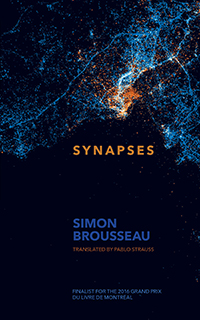Reviews
Fiction Review by Ian MacLean
Simon Brousseau, Synapses, translated by Pablo Strauss (Vancouver: Talonbooks, 2019). Paperbound, 172 pp., $19.95.
 Simon Brousseau’s Synapses is not a book with familiar narrative features; nor is it storyless. Rather, it presents the world as it is, a world where everyone is in the midst of their own stories, in the midst of their own becoming. It’s a work in which the author seeks to present a collection of disparate moments from disparate backgrounds, to join them together, and perhaps make them equally weighted.
Simon Brousseau’s Synapses is not a book with familiar narrative features; nor is it storyless. Rather, it presents the world as it is, a world where everyone is in the midst of their own stories, in the midst of their own becoming. It’s a work in which the author seeks to present a collection of disparate moments from disparate backgrounds, to join them together, and perhaps make them equally weighted.
In brief, interchanging passages, a character who is sometimes identified, sometimes unidentifiable (and always with the pronoun “you”) is living a single moment in a single long sentence. Someone receives a text message from an old friend, and reflects on the complexities of that friendship. An old woman ruminates on how her husband died next to her in bed. A violent someone plays violent video games. A young girl starts going to a tanning salon in the hopes of becoming popular. An aging character reflects on time while canning fruit. A thirteen-year-old, saddened over the suicide of their favourite musician, contemplates suicide themselves. Here is a sample sentence:
At night you go out to your favourite bars, where the light is low and you can blend in with a crowd that effortlessly ignores you, and once you get drunk enough the black turtleneck you like to wear transforms you into a bodiless head, pure mind atop a plinth of muscle supporting a face that scarcely belongs to you anymore, now strangely white and round like the oculus of the Pantheon, and it takes you away from the heaviness of your life, the men’s leers that have engulfed you since you developed breasts and a woman’s scent, and you feel relief bordering on euphoria as you sip your third Bloody Mary and bite into an ice cube.
Everyday moments that feel familiar are juxtaposed with the reality of someone you can never truly know, and everything in turn is uplifted with the occasional passage of existential thought or lyrical strength. Through the “literary snapshots” form of this book, the banal or boring details that make up life are interspersed with more exciting ones, or moments of peace, and are quite well laid out. The mind searches for and finds pleasing dialogic connections between the snapshots.
While reading this book, I found it compared favourably to Tor Ulven’s highly regarded novel, Replacement (English translation 2012), celebrated in Norway (it was an influence on Karl Ove Knausgaard) and elsewhere for its pioneering technique of snapshots of symphonic voices to make a whole. Synapses, consciously or not, seems an extension of Replacement’s technique and frame of thinking, and is an engaging effort, exploring similar themes on different grounds, where messages of empathy, interconnectedness, and lyricism are sought after and sometimes won.
The end result is less like reading a novel than dipping into a pool of shared human experiences and letting your own modern anxieties dissolve in the waters. I struggle with using the word “pool” here instead of “ocean,” as the writing is billed in the promotional materials as depicting “a vast society of differing psyches,” and “inviting you to join the network of humanity the book creates.” The lives described in the book are, for the likely majority of its readers, recognizable as strictly cosmopolitan, centring mostly on city life, suburban childhood memories, boyfriends and girlfriends out at clubs, people using their smartphones too often, and the anxieties of college students and professors. There are only a handful of sections that feel diverse in this experience of city life, where one can feel the otherness expressed by anyone from a diverse cultural background. At length, this lack of imaginative or diverse characters makes the whole seem somewhat under-representative and wanting in scope. More focus, and thought, put into the diverse experiences inherent within a city would have led to a more enjoyable, and truer, read.
In the end, though, to challenge one’s, and others’, imagination to think in larger, empathetic modes of scale is an admirable practice indeed. The nature of a book like this, the limits and struggles inherent, and the humility required, in one person attempting this ambitious mental exercise (and how this idea/want might rear its head in an everyday situation), is well communicated and exemplified by the author in this passage:
Since they’re a constant struggle sapping your dwindling reserves of energy, your fights with your boyfriend over your so-called inability to open up because you’d rather keep your thoughts all bottled up inside only serve to dig an ever-widening chasm between the two of you, and his desire to understand slides slowly into the anger of a tyrant demanding his tribute and his due, as if he can’t accept that people are hermetically sealed, and seeks to pierce the secret concealed in your cranium, and thus to nourish, in his refusal to admit that he is demanding the impossible, the vain hope of spending a moment, even just five seconds, in your head.
—Ian MacLean









